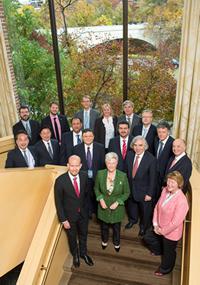
Energy and environment ministers from the Carbon Sequestration Leadership Forum’s (CSLF) member nations today endorsed carbon capture and storage technologies (CCS) as a key component of international plans to combat climate change. Their endorsement at a high-level meeting here is viewed as affirmation that carbon capture and storage must be an integral component of any international plan to combat climate change.
In a Communiqué released following day-long discussions, CSLF member country Ministers and Heads of Delegation affirmed that CCS is an indispensable element of any effective response to climate change. The Ministers stressed “we are convinced that the demonstration and global deployment of carbon capture and storage must be accelerated and we are committed to taking necessary actions individually and collaboratively to make this happen.”
CCS is a group of technologies for capturing carbon dioxide (CO2), a major greenhouse gas, emitted by power plants or industrial facilities and safely injecting it deep underground into suitable, permanent geologic storage sites. It is increasingly viewed by international experts as an essential part of a portfolio of responses by the world to effective management and reduction of human-based CO2 emissions.
The Communique’ points out that CCS is a low-carbon technology option critical to the global quest to reduce greenhouse gas emissions to the atmosphere, and CCS is the only climate change mitigation technology option available to significantly reduce carbon dioxide emissions from both coal and gas-fired power plants and a range of industrial processes including cement and steel manufacturing.
While valuable experience has been gained during the past decades, the next seven years are critically important for creating the conditions for CCS to be ready for large-scale deployment by the end of the decade, according to the Ministers. “It is clear that significant progress has been made on CCS, challenges remain, but these are challenges that we can — and will — overcome."
The Ministers stressed that their common goal is to ensure that the conditions are right for completing CCS projects currently under construction or in advanced stages of planning , and that the number of new large CCS demonstrations is increased by 2020 to enable future commercial deployment in the early 2020’s.
The CSLF Ministers outlined key actions needed for CCS deployment:
- Develop predictable financial frameworks and incentive mechanisms to drive near-term deployment of CCS by enabling CCS technologies to compete with other low carbon technologies;
- Develop workable CCS demonstration and deployment strategies in both the power and industrial sectors, recognizing that without CCS, the cost to meet aggressive greenhouse gas reduction goals will be significantly higher;
- Stress the vital importance of global coordinated efforts on coherent and optimal CCS research, development, and demonstrations, and actively seek and support such opportunities through bilateral and multilateral collaboration with other key bodies including the International Energy Agency and the Global Carbon Capture and Storage Institute.
- Continue establishing permitting frameworks that will ensure the safety and integrity of integrated CCS systems, and eliminate unnecessary obstacles for their deployment;
- Recognize the need for pre-commercial storage validation and encourage cooperation between countries to identify and assess shared geological storage resources and develop plans for their orderly development, including development of associated transport systems;
- Strengthen our national, regional and international efforts to improve understanding among the public and stakeholders of CCS technology and the importance of its deployment;
- Support efforts to grow capacity in CCS and foster appropriate steps in knowledge sharing and technology transfer.
The CSLF is a Ministerial-Level international climate change initiative marshaling worldwide resources to develop improved, cost-effective technologies for the separation, capture, transport, and long-term storage of CO2 from power plants and industrial facilities. CSLF membership includes 22 developed and developing nations, including China and India, and the European Commission, united in seeking practical and constructive ways of dealing with concerns about CO2 and climate change. CSLF member countries account for approximately 60 percent of the world's population -- 3.5 billion people; 76 percent of world man-made CO2 emissions; 75 percent of world energy consumption; 70 percent of world energy production; and 76 percent of world GDP. Forum membership spans the world's largest blocs of economic activity, including the North America Free Trade Area, the European Union and the leading economies of Asia. Members are Australia, Brazil, Canada, China, the European Commission, France, Germany, Greece, India, Italy, Japan, Mexico, the Netherlands, New Zealand, Norway, Poland, Russia, Saudi Arabia, South Africa, South Korea, United Arab Emirates, the United Kingdom and the United States.
- Log in to post comments
